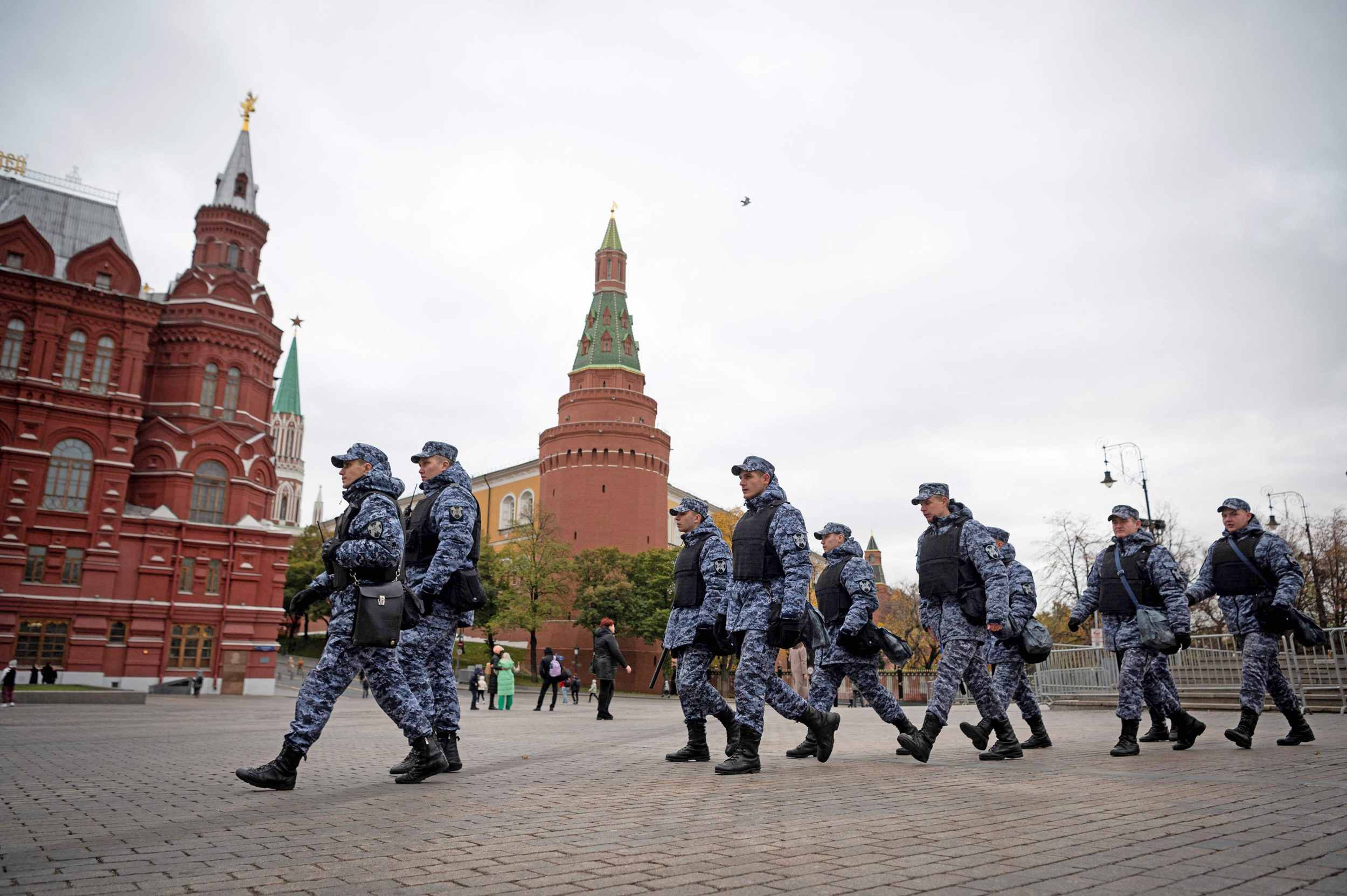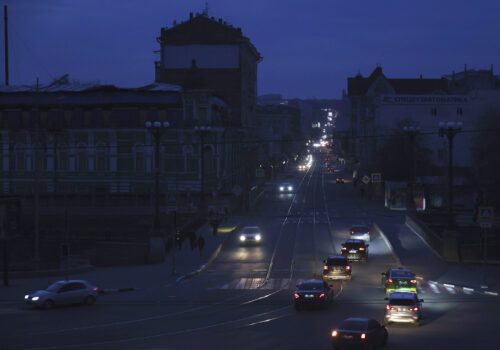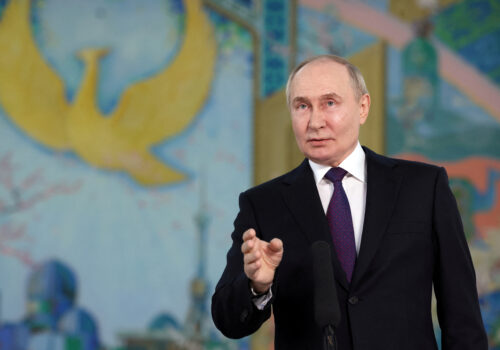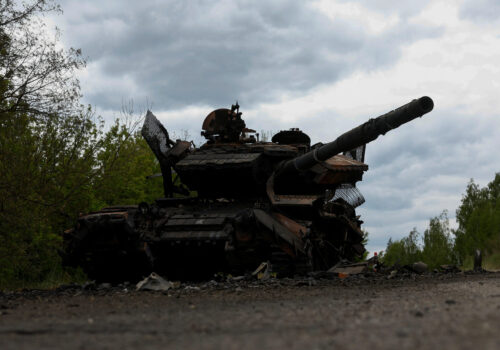What will Vladimir Putin do next if he wins in Ukraine? In recent months, more and more Western policymakers have reached the conclusion that a victorious Russia would almost certainly expand the war deeper into Europe as Putin seeks to rewrite the existing world order and continue on his crusade to return “historically Russian lands.” This realization is helping to rally support for Ukraine, with leaders such as French President Emmanuel Macron now openly warning that a Russian victory would have disastrous consequences for the rest of Europe.
Not everyone is convinced, of course. Many skeptics point to the Russian army’s surprisingly poor performance during the invasion of Ukraine, and argue that Putin is clearly in no position to embark on further military adventures. According to the doubters, Russia’s obvious difficulties in Ukraine mean Moscow cannot be regarded as a genuine threat to the far greater military might of the NATO alliance. Indeed, some are convinced that any direct Russian attack on the West would amount to a suicide mission.
This argument is dangerously shortsighted. Crucially, it ignores the profoundly positive impact military success in Ukraine would have on the Kremlin’s ability to wage war. Russian victory over Ukraine would transform the geopolitical situation, greatly strengthening Russia militarily, economically, and strategically, while severely weakening the West. Faced with such uniquely favorable circumstances, it is delusional to believe a triumphant Putin would not seek to go further.
Stay updated
As the world watches the Russian invasion of Ukraine unfold, UkraineAlert delivers the best Atlantic Council expert insight and analysis on Ukraine twice a week directly to your inbox.
While there is no doubt that the Russian army has failed to live up to its inflated prewar reputation, it would be reckless to underestimate Russia’s military potential. Putin’s commanders have learned a series of important lessons since the start of the invasion in February 2022, and have acquired combat experience that no other major power can match. With a battle-hardened and rapidly modernizing army backed by a military-industrial complex operating around the clock, Putin is now arguably in a stronger position relative to his Western adversaries than any Russian ruler since 1945. Victory in Ukraine would further widen this already alarming gap in military capabilities.
The Russian and Ukrainian armies are currently by far the largest and most formidable fighting forces in Europe. If Putin triumphs in Ukraine, he will control them both. A victorious Russia would look to rapidly conscript hundreds of thousands of Ukrainians into military service, just as it has already done in areas of Ukraine under Kremlin control. In addition to a massive manpower boost, Russia would also take possession of Ukraine’s extensive military equipment stores, ranging from stockpiles of artillery shells and attack drones to Western-supplied tanks and missile systems.
Control over Ukraine would allow Russia to reintegrate the vast Ukrainian military-industrial complex that played such a central role in arming the Red Army during the Cold War. For much of the Soviet era, Ukraine produced a large proportion of the USSR’s missiles, tanks, aircraft, and warships. This colossal industrial inheritance was neglected during the first three decades of Ukrainian independence and fell into a state of disrepair, but a Russian occupation administration or Kremlin-loyal puppet regime in Kyiv would likely prioritize the revival of military production. This increased capacity would allow Russia to rapidly rearm after the punishing losses of the Ukrainian campaign, while also enabling Moscow to overcome many of the obstacles created by Western sanctions.
Economically, the conquest of Ukraine would significantly improve Russia’s financial position and strengthen Moscow’s ability to shape world affairs. The Kremlin would acquire Ukraine’s sizable untapped energy resources along with potentially trillions of dollars in mineral assets. Meanwhile, the famed Ukrainian breadbasket would enable Russia to establish itself virtually overnight as the dominant force on international agricultural markets. Putin has already demonstrated his readiness to weaponize global food security by blockading Ukraine’s Black Sea ports. Control over Ukraine’s farming industry would present the Kremlin with far more powerful tools to reward allies and punish opponents.
Many in the Global South would not need to be bribed with grain shipments or coerced by the threat of famine. Instead, they would recognize Russian victory in Ukraine as a major geopolitical turning point and voluntarily queue up to pay their respects in Moscow. The emphasis on diplomatic neutrality that is currently evident in much of Asia, Africa and beyond would be replaced by a scramble to strengthen ties with the Kremlin. Countries throughout the Global South would begin to ship arms and other military supplies to Moscow, while the West’s already limited ability to impose sanctions on Russia would become hopelessly compromised. Commentators everywhere would soon be trumpeting the dawn of a new post-Western era in international affairs.
Where would a strengthened and emboldened Putin be most likely to strike next? The Kremlin dictator has made clear that he sees the current war as an imperial quest to return “historically Russian lands.” Beyond Ukraine, there are more than a dozen other countries including Finland, Poland, the Baltic states, Belarus, and Moldova that were once part of the Russian Empire and therefore meet Putin’s definition of “historically Russian.” All would be potential targets. During the build-up to the full-scale invasion of Ukraine in late 2021, Putin underlined the scale of his ambition by calling on NATO to retreat to the borders of the former Warsaw Pact. It seems reasonable to assume that success in Ukraine will only make him more ambitious.
The Russian dictator currently has little reason to fear the West. Almost two-and-a-half years into the largest European invasion since World War II, Kyiv’s partners remain preoccupied with avoiding escalation and continue to impose absurd restrictions on Ukraine’s ability to defend itself. This escalation management is the appeasement of the twenty-first century, and risks inviting the same tragic consequences.
If Putin expands his war further, the one thing Western leaders cannot do is claim they did not know. Putin has openly placed the whole of Russian society on a war footing and is evidently preparing his country for a protracted struggle against the West. The invasion of Ukraine is a key part of this struggle, but it is only the beginning. Victory in Ukraine would supercharge Putin’s war machine while radically increasing the cost of stopping him. The only way to avoid this disastrous outcome is by defeating Russia in Ukraine. This remains realistic, but it will require a firm commitment to Ukrainian victory among the country’s allies that has so far been lacking.
Peter Dickinson is editor of the Atlantic Council’s UkraineAlert service.
Further reading
The views expressed in UkraineAlert are solely those of the authors and do not necessarily reflect the views of the Atlantic Council, its staff, or its supporters.

The Eurasia Center’s mission is to enhance transatlantic cooperation in promoting stability, democratic values and prosperity in Eurasia, from Eastern Europe and Turkey in the West to the Caucasus, Russia and Central Asia in the East.
Follow us on social media
and support our work
The post Victory in Ukraine would dramatically strengthen Putin’s war machine appeared first on Atlantic Council.





